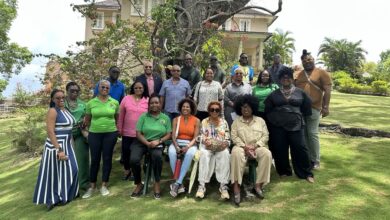(First published in the CARICOM Secretariat Publication, CARICOM View (CARIFESTA: Showcase of Caribbean Culture, July-September 2007)
Riding in a chartered bus in downtown Kingston, Jamaica last year, Eddy Grant, the leading Barbados-based, Guyana-born Caribbean pop singer, music mogul and entrepreneur, pondered the future of the Caribbean given its continued dependence on traditional export commodities like rice, sugar and bananas.
“The time for those has long passed,” he said at the end of a day-long debate in Jamaica on the need for the Region to pay greater attention to its much-vaunted creative industry, music, dance, natural scenery, folklore and others of the same genre.
“I have said to Caribbean leaders and politicians that they should pay more attention to our music. One day very soon it will supplant rice and sugar. To my disbelief, they often laugh,” an angry Grant said.
In recent months, the signs have become clearer than ever that the Region’s premier export industries – rice, sugar and bananas are on the downward spiral given new global trading rules under the umbrella of the Geneva-based World Trade Organization (WTO) and its predecessor agencies.
Over the next three years, sugar exporters will see prices paid by European Union (EU) buyers drop by an astonishing 36 percent, translating to an annual loss of around US$100M.
Guyana, Jamaica, Barbados and Belize are going to be the hardest hit. The new pricing regime and soaring production costs have already helped St. Kitts and Nevis leave an industry that had been an economic mainstay for 400 years, while oil and gas-rich Trinidad and Tobago prepares to leave a sector that is fast becoming economically and financially irrelevant.
The same is true of bananas. New import tariffs in the EU now threaten to make exports of bananas by US-owned, Latin American-based companies much easier and more lucrative as the tax regime would render Caribbean fruit too expensive to compete. Rice also has its tariff problems that would affect exports mainly from Guyana and Suriname.
Folks like Grant, lobbyist Josanne Leonard, Third World band founder Ebo Cooper and Patricia Francis, the former director of Jampro, Jamaica’s high profile export promotion agency, say all they want is for governments to take time out to review the situation and to radically change their thinking.
Francis says, for example, that music revenue from Jamaican and international superstar Sean Paul, annually surpasses that of banana exports. For her, the verdict is clear – the creative industry needs attention from Regional officialdom.
Grant and Cooper say they even want formal meetings with the Regional Negotiating Machinery (RNM) to remind them of the changing face of Regional and international economics and to lobby for places on RNM teams as advisors on matters cultural.
So far they have at least one ally on board in the form of RNM expert Lincoln Price. He says the Regional reality has to get a new focus.
“We have to look at culture as a trade issue. The Caribbean reality is that we have a fading, old economy of sugar, banana and rice. We have not taken the creative industry seriously. We cannot have this status quo continue.”
Tightening copy right laws to outlaw piracy so musicians and artistes can earn a decent living must become a key agenda item of Regional summits and ministerial meetings rather than the old industries only.
Additionally, the practice of allowing foreign television networks like MTV and BET to come into the Region, film major cultural festivals for free and air them earning billions should also cease, Grant and Cooper argue with great merit.
In September last year, leaders and ministers from countries in the Organization of Eastern Caribbean States (OECS) met in Saint Lucia to discuss mounting missions to Europe to defend the sagging banana industry.
Days later, foreign ministers from the wider CARICOM did likewise in Barbados. Bananas and sugar were also dominant themes. No one represented the creative industry to any degree, officials readily admitted. The cycle of depending on colonial era sectors rather than switching attention to Reggae, Calypso, Soca Zouk, SuriPop and other forms, remains intact.
“We are yet to understand the power of what we have. Other people have made money from what we created. We need to step back and look at it,” notes Francis. Cooper says “we don’t understand the little man creating a mega tune under a tree. We think he is a worthless person but many times it is just inspiration.”
Francis says major Hollywood studios like Paramount Pictures and Universal fly thousands of miles to other countries for location film shoots when “the Caribbean is right here in their backyard, our beautiful Caribbean.” The point is further strengthened by the fact that two of the highest grossing movie productions of all time, “The Pirates of the Caribbean” series were shot principally on Caribbean locations in St Vincent and the Grenadines, Dominica and The Bahamas.
The answer, lobbyists argue, is for tourism boards, hoteliers and tourism umbrella associations, governments and other stakeholders to band together, draw up a budget and approach the mega studios offering them tax and other concessions similar to those given to other types of investors.
From The Bahamas to Belize in the north, to the south Caribbean island chain to Guyana and Suriname on the South American mainland, world class locations for shoots can be easily found but the marketing aspects of this are way behind if not non-existent, industry players argue.
For Leonard and Grant, politicians are not the only ones who need lobbying or re-education: the Regional media need to lead the fight for a new economic order as well.
Opinion writers should now begin attempting to refocus the Region to the new reality, given the continuing international assault on rice, sugar and bananas and even rum that is so linked to the sugar industry.
Guyana is investing more than US$130M in a new state-of-the-art sugar factory near Suriname. Other governments are planning other economic adjustments to cope with the international attack on the colonial sectors. Not much is being poured into the area of our most natural talent, music, theatre and dance, officials say. (Written by Bert Wilkinson)






